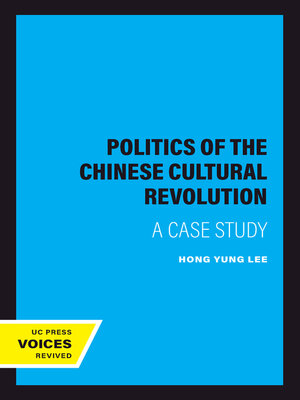
Sign up to save your library
With an OverDrive account, you can save your favorite libraries for at-a-glance information about availability. Find out more about OverDrive accounts.
Find this title in Libby, the library reading app by OverDrive.



Search for a digital library with this title
Title found at these libraries:
| Loading... |
Hong Yung Lee's account of the Cultural Revolution illuminates its complexities and subtleties to an unprecedented degree. His primary concern is with the behavior of the masses once they were freed from party control, and his analysis of voluminous Red Guard publications highlights the different membership characteristics, positions, and strategies of both the student Red Guards and the worker Revolutionary Rebels, divided internally along a conservative-radical line.
Rejecting the ideologically oriented assumption that workers and students of worker or peasant origin comprised the majority of the radical elements, Lee argues that students of bourgeois and other "bad" origins, workers in small factories, "sent-down" students, and demobilized soldiers were the radicals, whereas students from families with pre-1949 revolutionary careers and workers in large-scale and modern enterprises were found in large numbers among the conservatives. He contends that, contrary to some social science theories, the radicals were motivated by rational rather than ideological considerations, and that they attacked the status quo because it was they who experienced discrimination under the existing political system, whereas the conservatives generally belonged to favored social groups. Lee demonstrates that an adequate history of the Cultural Revolution cannot restrict itself to an analysis of policy difference among the elites, but must consider the behavior of the masses and their relationship with the elites.
This title is part of UC Press's Voices Revived program, which commemorates University of California Press's mission to seek out and cultivate the brightest minds and give them voice, reach, and impact. Drawing on a backlist dating to 1893, Voices Revived makes high-quality, peer-reviewed scholarship accessible once again using print-on-demand technology. This title was originally published in 1978.
Rejecting the ideologically oriented assumption that workers and students of worker or peasant origin comprised the majority of the radical elements, Lee argues that students of bourgeois and other "bad" origins, workers in small factories, "sent-down" students, and demobilized soldiers were the radicals, whereas students from families with pre-1949 revolutionary careers and workers in large-scale and modern enterprises were found in large numbers among the conservatives. He contends that, contrary to some social science theories, the radicals were motivated by rational rather than ideological considerations, and that they attacked the status quo because it was they who experienced discrimination under the existing political system, whereas the conservatives generally belonged to favored social groups. Lee demonstrates that an adequate history of the Cultural Revolution cannot restrict itself to an analysis of policy difference among the elites, but must consider the behavior of the masses and their relationship with the elites.
This title is part of UC Press's Voices Revived program, which commemorates University of California Press's mission to seek out and cultivate the brightest minds and give them voice, reach, and impact. Drawing on a backlist dating to 1893, Voices Revived makes high-quality, peer-reviewed scholarship accessible once again using print-on-demand technology. This title was originally published in 1978.






